|
Books Should Be Free Loyal Books Free Public Domain Audiobooks & eBook Downloads |
|
|
Books Should Be Free Loyal Books Free Public Domain Audiobooks & eBook Downloads |
|
Science Fiction |
|---|
|
Book type:
Sort by:
View by:
|
By: Charles B. Cory (1857-1921) | |
|---|---|
 Montezuma's Castle and Other Weird Tales
Montezuma's Castle and Other Weird Tales
This is a collection of weird tales inspired from the natural history expeditions of the author, an independently wealthy bird collector, Olympic golfer, writer of many books on birds of the world, and, as evidenced in these pages, a fine storyteller to boot. | |
By: Willis George Emerson (1856-1918) | |
|---|---|
 Smoky God or a Voyage to the Inner World
Smoky God or a Voyage to the Inner World
The Smoky God, or A Voyage Journey to the Inner Earth is the narrative of an aged Norwegian sailor compelled before he dies to tell the story of how he found a passageway to the center of the earth and discovered a world peopled with giants. | |
By: Donald Wollheim (1914-1990) | |
|---|---|
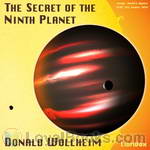 The Secret Of The Ninth Planet
The Secret Of The Ninth Planet
An alien race has put a station on Earth and other planets in order to steal the rays of the sun, possible causing the sun to nova within two years. Burl Denning, a high school student, is the only person who has the power to stop the alien project. Can he and the crew of the experimental space ship Magellan act in time to save the earth? | |
By: Gabriel Tarde (1843-1904) | |
|---|---|
 Underground Man
Underground Man
This post-apocalyptic novella tells the story of the downfall of civilisation and mankind following a solar cataclysm in the late 20th century. To survive, the remnants of humanity had to build a new civilization underground in the complete absence of all species except mankind, choosing to base it only on love and beauty, the fine arts and intellectual pursuits. In view of the sun's current inactivity, this frighteningly prophetic tale might have been written today, saving that the cultural references and the fluid prose might be beyond, if one dares say so, many modern writers... | |
By: Alfred Lawson (1869-1954) | |
|---|---|
 Born Again
Born Again
"I doubt that anyone who reads [Born Again] will ever forget it: it is quite singularly bad, with long undigestible rants against the evils of the world, an impossibly idealistic Utopian prescription for the said evils, and - as you will have gathered - a very silly plot." - oddbooks.co.ukAlfred Lawson was a veritable Renaissance man: a professional baseball player, a luminary in the field of aviation, an outspoken advocate of vegetarianism and economic reform, and the founder of a pseudo-scientific crackpot philosophy called Lawsonomy... | |
By: Various | |
|---|---|
 X Minus One Project
X Minus One Project
This is a collection of public domain science fiction stories which were turned into half-hour plays for the classic mid-1950's American radio series, X Minus One. All of these stories were added to Project Gutenberg via Greg Weeks and crew at Distributed Proofreaders. | |
By: Philip K. Dick (1928-1982) | |
|---|---|
 Mr. Spaceship
Mr. Spaceship
The war with the Yucks from Proxima Centauri was claimed to be a stalemate but they were really winning. The mine belts they laid seemed to propagate themselves and were slowly strangling Terran planets. How did they do that? What was their secret? The answer was baffling and the best human minds could only conclude that their ships and mines were somehow alive. So, the next desperate step was to ask "If they are using organic ships, why can't we do the same?". Thus Mr. Spaceship was conceived and carried out. But will a conscious warship do what the generals wish? Perhaps and perhaps something entirely surprising! | |
By: Harry Harrison (1925-) | |
|---|---|
 The Misplaced Battleship
The Misplaced Battleship
"It might seem a little careless to lose track of something as big as a battleship ... but interstellar space is on a different scale of magnitude. But a misplaced battleship—in the wrong hands!—can be most dangerous." The world class con man and thief known as the Stainless Steel Rat (diGriz) has another very big problem to solve and this science fiction novella by the great Harry Harrison will see if he can solve it and perhaps four or five more like it before this fascinating and funny tale is finished. 'Use a thief to catch a thief' sounds great but it sometimes has unexpected results. | |
By: H. Beam Piper (1904-1964) | |
|---|---|
 A Slave is A Slave
A Slave is A Slave
The Galactic Empire is slowly 'welcoming' into the family of civilized worlds those systems so far off in the backwater of the galaxy that they have been overlooked and ignored for the past 500 years or so. This is purely routine work because every planet offered the chance has eagerly accepted the invitation. Mainly because the enlightened Empire lets the planetary government continue to rule and do whatever it wants...with a few minor restrictions of course; and because the they are shown what happens to planets who decide not to accept the invitation... | |
By: Harry Harrison (1925 -) | |
|---|---|
 The K-Factor
The K-Factor
The human race has reached the stars, colonized many planets and done amazing things in all areas of scientific progress. But humans are still humans and remain both honorable and not so honorable; some with high ideals and others with very low ones indeed. So why hasn't war occurred in several centuries among the hundreds of planets? Has man really changed? Not on your life it hasn't! Read how science has given man peace but at what cost? | |
By: E.E. Smith (1890-1965) | |
|---|---|
 The Vortex Blaster
The Vortex Blaster
Uncontrolled, terribly violent Atomic Vortices are slowly destroying civilization on every human planet throughout the galaxy. Nothing can contain or stop them despite the lensmen's best efforts until one destroys the home and family of "Storm" Cloud, brilliant atomic physicist. The tragedy triggers actions on his part that pit him one-on-one against the horrible vortices. Introducing "storm" Cloud as THE Vortex Blaster | |
By: Harry Harrison (1925-2012) | |
|---|---|
 The Repairman
The Repairman
This is a collection of 3 of Harry Harrison marvelous early stories that were published in Galaxy, Analog and Fantastic Universe. The Repairman (1958) is a straight fun SF story of a man getting a job done. It is most typical of his later style in series like the Stainless Steel Rat; Toy Shop (1962), a short piece exploring bureaucratic blindness and one ingenious way around it and The Velvet Glove (1956), my favorite for its writing style, fun perspective, sly social commentary on the scene in 1956 and just plain delightful imagination. And he manages to pack excitement and mystery in at the same time. | |
By: Ray Cummings (1887-1957) | |
|---|---|
 The World Beyond
The World Beyond
Lee Anthony finds himself and two of his friends kidnapped and taken on a strange voyage. | |
By: Charles W. Diffin (1884-1966) | |
|---|---|
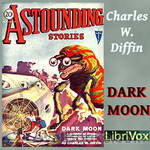 Dark Moon
Dark Moon
Mysterious, dark, out of the unknown deep comes a new satellite to lure three courageous Earthlings on to strange adventures. | |
By: Lloyd Eshbach (1910-2003) | |
|---|---|
 The Gray Plague
The Gray Plague
End of the world sci-fi tale borrows heavily from H.G. Wells' WOTW and In The Days of the Comet -- looks like fun ! | |
By: Randall Garrett (1927-1987) | |
|---|---|
 A Spaceship Named McGuire
A Spaceship Named McGuire
Can a spaceship go crazy? Well, yes it can if it has a brain. And the new MG (magnetogravitic drive) experimental robot space ship does indeed have a 'brain'. Completely bewildered as to why the first six models of their supposedly perfect new ship model, the MG-YR, nicknamed the McGuire, have gone totally bonkers after activation and before they could ever be used, the company has called in the services of Daniel Oak. They suspect sabotage of course. Daniel Oak is the hard boiled private investigator with nerves of steel and a mind of the same substance... | |
By: Camille Flammarion (1842-1925) | |
|---|---|
 Omega: The Last Days of the World
Omega: The Last Days of the World
Omega: The Last Days of the World is a science fiction novel by astronomer Camille Flammarion. On 25th century Earth, a comet is on a path to collide with the Earth ending it all. Astronomers predict different scenarios as to how they will all die depending on the chemical composition of the comet. Omega probes the philosophical and political consequences that arise as the human race faces the end of the world. | |
By: Murray Leinster (1896-1975) | |
|---|---|
 The Ambulance Made Two Trips
The Ambulance Made Two Trips
Big Jake Connors is taking over his town through violence, inimidation and bribery but Detective Sergeant Fitzgerald can only grind his teeth in frustration. The gangsters seem to have everything going their way until the day that a little dry cleaning establishment declines their offer of 'protection' and strange things start to happen. Murray Leinster gives us another wonderful product of 'what if' from his limitless imagination to enjoy in this gem of a story. Listen and smile. | |
By: Poul Anderson (1926-2001) | |
|---|---|
 The Chapter Ends
The Chapter Ends
Far, far in the future the Earth is still spinning around the Sun, on the edge of the galaxy, dozing in obscurity, forgotten by it's trillions of progeny and completely irrelevant. But this doesn't matter to the few millions who still live there in simplicity and quiet happiness. But then interstellar politics dictates that they must all leave Earth because ... well, listen to the story as told by the great Poul Anderson as he explores what the Earth means to humans and to one man in particular. | |
By: H. G. Wells (1866-1946) | |
|---|---|
 The Secret Places of the Heart
The Secret Places of the Heart
Richard Hardy, a member of the British gentry, tries to resolve problems in his marriage as he travels with a psychiatrist. The book is to a great extent autobiographical. H. G. had read some brilliantly composed articles by a writer who wrote under the name Rebecca West. In one piece she called H. G. "pseudo-scientific." He contacted her and asked what she meant. When they met for lunch, it was the beginning of a very intense and volatile relationship. Soon she was pregnant, so he divided his time between her and his wife Jane with their two sons... | |
By: Harl Vincent (1893-1968) | |
|---|---|
 Astounding Stories 02, February 1930
Astounding Stories 02, February 1930
This is the second issue of the classic science fiction Astounding Magazine. It contains the finale of The Beetle Horde by Victor Rousseau, as well as stories by Harl Vincent, Charles Willard Diffin, Hugh B. Cave, Sophie Wenzel Ellis, Sterner St. Paul, Anthony Pelcher and Captain S. P. Meek. | |
By: Francis Godwin (1562-1633) | |
|---|---|
 The Man in the Moone
The Man in the Moone
A self-serving Spaniard discovers a means of traveling to the moon, describing his sensations in transit in terms remarkably consistent with modern astronauts' experiences. He finds on the moon a utopia, which he describes in detail, but being a fallen creature, he takes the first opportunity of coming home. ( | |
By: Randall Garrett (1927-1987) | |
|---|---|
 Nor Iron Bars A Cage....
Nor Iron Bars A Cage....
Iron bars do not confine a Man—only his body. There are more subtle, and more confining bindings, however....Police methods of the future will naturally use complex new technology but police will still need to deal with the same old sad human nature, that is forever doing horrible deeds. The night stick may be replaced by the hypo-gun but is prison the only solution? Listen to this speculative story from Randall Garrett bizarre mind and see. | |
By: Anthony Pelcher (1897-1981) | |
|---|---|
 Astounding Stories 04, April 1930
Astounding Stories 04, April 1930
The fourth issue of Astounding Stories continues Ray Cummings serial "Brigands of the Moon", along with pulp sci-fi stories by Capt. S. P. Meek, Anthony Pelcher and other authors. | |
By: Harl Vincent (1893-1968) | |
|---|---|
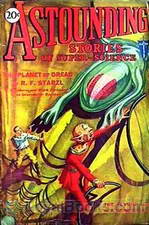 Astounding Stories 08, August 1930
Astounding Stories 08, August 1930
Issue eight of this seminal science-fiction magazine CONTENTS Murder Madness by Murray Leinster - the conclusion of this novel Earth the Maurader by Arthur J. Burks - Part 2 of a 3 Part novel as well as short Stories The Planet of Dread by R.F. Starxl, The Lord of Space by Victor Rousseau, The Second Satellite by Edmund Hamilton, Silver Dome by Harl Vincent and The Flying City by H. Thompson Rich | |
By: Murray Leinster (1896-1975) | |
|---|---|
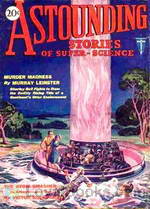 Murder Madness
Murder Madness
Murder Madness! Seven Secret Service men had completely disappeared. Another had been found a screaming, homicidal maniac, whose fingers writhed like snakes. So Bell, of the secret "Trade," plunges into South America after The Master--the mighty, unknown octopus of power whose diabolical poison threatens a continent! | |
By: Captain S. P. Meek (1894-1972) | |
|---|---|
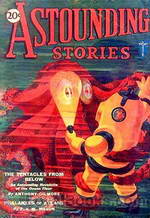 Astounding Stories 14, February 1931
Astounding Stories 14, February 1931
This issue includes "Werewolves of War" by D. W. Hall, "The Tentacles from Below" by Anthony Gilmore, "The Black Lamp" by Captain S. P. Meek, "Phalanxes of Atlans" by F. V. W. Mason, and contues with "The Pirate Planet" by Charles W. Diffin, | |
By: Sewell Peaslee Wright (1897-1970) | |
|---|---|
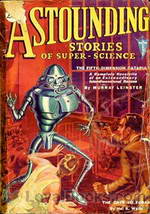 Astounding Stories 13, January 1931
Astounding Stories 13, January 1931
This issue contains "The Dark Side of Antri" by Sewell Peaslea Wright, "The Sunken Empire" by H. Thompson Rich, "The Gate to Xoran" by Hal K. Wells, "The Eye of Allah" by C. D. Willard, "The Fifth-Dimension Catapult" by Murray Leinster, and "The Pirate Planet[' by Charles W. Diffin. | |
 Astounding Stories 07, July 1930
Astounding Stories 07, July 1930
Issue seven of this seminal science-fiction magazine | |
By: Jack Williamson (1908-2006) | |
|---|---|
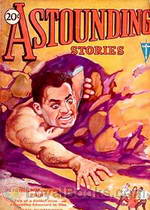 Astounding Stories 15, March 1931
Astounding Stories 15, March 1931
This issue includes "When the Mountain Came to Miramar" by Charles W. Diffin, "Beyond the Vanishing Point" by Ray Cummings, "Terrors Unseen" by Harl Vincent, the conclusion of "Phalanxes of Atlans" by F. V. W. Mason, and "The Meteor Girl" by Jack Williamson. | |
By: Charles Willard Diffin (1884-1966) | |
|---|---|
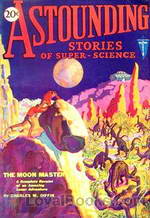 Moon Master
Moon Master
Through Infinite Deeps of Space Jerry Foster Hurtles to the Moon—Only to be Trapped by a Barbaric Race and Offered as a Living Sacrifice to Oong, their Loathsome, Hypnotic God. | |
By: Harl Vincent (1893-1968) | |
|---|---|
 Astounding Stories 10, October 1930
Astounding Stories 10, October 1930
Issue no. 10 of the magazine brings you:- Stolen Brains by Captain S.P. MeekThe Invisible Death by Victor Rousseau Prisoners on the Electron by Robert H. Leitfred Part 2 of Jetta of the Lowlands by Ray Cummings An Extra Man by Jackson Gee along with the Readers' Corner and interesting scientific facts | |
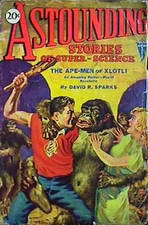 Astounding Stories 12, December 1930
Astounding Stories 12, December 1930
This issue includes "Slaves of the Dust" by Sophie Wenzel Ellis, Part B of "The Pirate Planet" by Charles W. Diffin, "The Sea Terror" by Captain S. P. Meek, "Gray Denim" by Harl Vincent, and "The Ape-Men of Xlotli" by David R. Sparks. | |
By: Kurt Becker. S. J. (1915-2010) | |
|---|---|
 Countdown
Countdown
The first flight to outer space became an actual fact – Mars would be the first stop. But before the spaceship took off, two insane enemies almost succeeded in preventing the departure. This science fiction story for teens was written by a Catholic priest. | |
By: Murray Leinster (1896-1975) | |
|---|---|
 Tanks
Tanks
Tanks and the future of war is what Murray Leinster speculates about in this story. Written in the 1920's he observed the terrible new inventions that were used in World War I to kill people, armored tanks and poisoned gas and then tells us how war will be fought in the future. In this case the war will occur in 1932 and be between the US and the 'Yellow enemy'. It was published in the very first issue of Astounding Stories of Super Science, January 1930. It is science fiction in the sense that it guesses what the future will hold for man based on developing the technology that was coming into being at the time, the 1920's... | |
 Forgotten Planet
Forgotten Planet
The "forgotten" planet had been seeded for life, first with microbes and later with plants and insects. A third expedition, intended to complete the seeding with animals, never occurred. Over the millennia the insects and plants grew to gigantic sizes. The action of the novel describes the fight for survival by descendants of a crashed spaceship as they battle wolf-sized ants, flies the size of chickens, and gigantic flying wasps. | |
By: Various | |
|---|---|
 Short Science Fiction Collection 048
Short Science Fiction Collection 048
Science Fiction is speculative literature that generally explores the consequences of ideas which are roughly consistent with nature and scientific method, but are not facts of the author’s contemporary world. The stories often represent philosophical thought experiments presented in entertaining ways. Protagonists typically "think" rather than "shoot" their way out of problems, but the definition is flexible because there are no limits on an author's imagination. The reader-selected stories presented here were written prior to 1962 and became US public domain texts when their copyrights expired. | |
By: Robert E. Howard (1906-1936) | |
|---|---|
 Devil in Iron
Devil in Iron
Conan's lustful desires again get him into a whole pile of trouble. This time the beautiful, golden haired, noble born Octavia, lures him into a fiendish trap set by his most powerful enemies and from which there seems to be no escape. But on the long deserted island of Xapur where he goes to capture this crafty beauty, it is not just mortal enemies that await him; Khosatral Khel a demon that crawled up from the abyss many eons ago and is of a substance as hard as iron has been awakened and is intent on crushing Conan and the woman like bugs for it's amusement... | |
By: Jane C. Loudon (1807-1858) | |
|---|---|
 Mummy! A Tale of the Twenty-Second Century
Mummy! A Tale of the Twenty-Second Century
The Mummy!: Or a Tale of the Twenty-Second Century is about a wise Egyptian mummy who is reanimated far in the future. With a different take on what lies ahead for civilization inspired from the exciting developments of the era, it is a strange, entertaining story and an early science fiction work by a woman novelist. | |
By: Ray Bradbury (1920-2012) | |
|---|---|
 Futuria Fantasia, Spring 1940
Futuria Fantasia, Spring 1940
A collection of short science fiction stories, edited by Ray Bradbury. Authors include Lyle Monroe, J. E. Kelleam, Hank Kuttner, J. H. Haggard, Ron Reynolds, Damon Knight, and Hannes V. Bok. | |
By: Robert E. Howard (1906-1936) | |
|---|---|
 Jewels of Gwahlur
Jewels of Gwahlur
Conan The Barbarian is after fabulous treasure in this exciting story. But he finds himself in more difficulties than he had counted on. Crafty and powerful human opponents seek to skin him alive, bestial mutations seek to rip his arms off, denizens of the deep want to devour him whole and scantily clad dusky beauties try to waylay him at every step. And all of this to find the Jewels of Gwahlur, the most fabulous treasure every hidden in a secret temple. Has Conan finally met his match? Will his evil enemies or the seductive women finally succeed in making him beg for mercy? Listen and find out... | |
 Beyond the Black River
Beyond the Black River
Conan the Barbarian is employed by one of the civilized countries to help in it's push to claim lands from the primitive Picts. The Picts are not excited about the idea however. Old gods and mythical creatures are called up by the Pict witches to contest the invading army and Conan finds himself battling for his life amid the blood thirsty hordes that include saber-toothed tigers, 40 foot long venomous snakes and a demon from another dimension who is intent on crushing him. The huge dog Slasher makes an appearance here and distinguishes himself so well in a doomed battle to delay their forces that Conan openly praises his courage and pledges that 7 Pict heads will roll in his honor. | |
 Witch Shall Be Born
Witch Shall Be Born
The kingdom of Khauran is admittedly a small one, nestled between the vast desert and the plains, but it is blessed with an abundance of rich soil, hard working devoted inhabitants and much gold but most of all by a sweet young queen who is as wise and beneficent as she is beautiful. But then from out of nowhere, disaster strikes. A horrible witch (her evil twin sister) secretly replaces her and introduces devil worship, human sacrifice and other things too repulsive to mention. Conan, who was the captain of her guard is captured and crucified in the desert... | |
By: Philip Wylie (1902-1971) | |
|---|---|
 Gladiator
Gladiator
Gladiator by Philip Wylie is the story of a man who although normal in all other ways, through the genius of his Father a biologist attains the strength and impregnability of a superman. The problems he encounters in trying to fit into a society of normal human beings who show fear and hatred whenever they view his abnormal strength and physical ability pains him to the point of having to leave civilization. | |
By: Jeff Sutton (1913-1979) | |
|---|---|
 First on the Moon
First on the Moon
The four men had been scrutinized, watched, investigated, and intensively trained for more than a year. They were the best men to be found for that first, all-important flight to the Moon--the pioneer manned rocket that would give either the East or the West control over the Earth.Yet when the race started, Adam Crag found that he had a saboteur among his crew ... a traitor! Such a man could give the Reds possession of Luna, and thereby dominate the world it circled.Any one of the other three could... | |
By: Various | |
|---|---|
 Short Science Fiction Collection 050
Short Science Fiction Collection 050
Science fiction is a genre encompassing imaginative works that take place in this world or that of the author’s creation where anything is possible. The only rules are those set forth by the author. The speculative nature of the genre inspires thought, and plants seeds that have led to advances in science. The genre can spark an interest in the science and is cited as the impetus for the career choice of many scientists. It is a playing field to explore social perspectives, predictions of the future, and engage in adventures unbound into the richness of the human mind. | |
By: Dallas McCord Reynolds (1917-1983) | |
|---|---|
 5 Science Fiction Stories by Mac Reynolds
5 Science Fiction Stories by Mac Reynolds
Five early stories by one of my favorite SF writers, Mack Reynolds. Medal of Honor is an intriguing look into the mind of someone who is above the law; who cannot commit a crime. How will he act? especially if he is a self centered drunk? Potential Enemy is story about the sad state of human minds that are ruled by fear and paranoia. Happy Ending is an SF story about the far future when the last solar system wide dictator has been finally defeated and what will he do? What will he do? This is also an exploration of mental megalomania and it's effects... | |
By: Various | |
|---|---|
 Short Science Fiction Collection 052
Short Science Fiction Collection 052
Science fiction is a genre encompassing imaginative works that take place in this world or that of the author’s creation where anything is possible. The only rules are those set forth by the author. The speculative nature of the genre inspires thought and plants seeds that have led to advances in science. The genre can spark an interest in the science and is cited as the impetus for the career choice of many scientists. It is a playing field to explore social perspectives, predictions of the future, and engage in adventures unbound into the richness of the human mind. | |
By: H. G. Wells (1866-1946) | |
|---|---|
 Wonderful Visit
Wonderful Visit
An other-worldly creature visits a small English village, and H. G. Wells uses humour and satire to convey some of the imperfections of Victorian society, as ‘angel’ and humans view each other with equal incomprehension.( | |
By: E. E. Smith (1890-1965) | |
|---|---|
 First Lensman
First Lensman
The Secret Planet. No human had ever landed on the hidden planet of Arisia. A mysterious space barrier turned back both men and ships. Then the word came to Earth, "Go to Arisia!", Virgil Samms of the Galactic Patrol went--and came back with the Lens, the strange device that gave its wearer powers no man had ever possessed before. Samms knew the price of that power would be high. But even he had no idea of the ultimate cost, and the weird destiny waiting for the First Lensman. First Lensman is the sequel to Triplanetary, and the second book of E.E. "Doc" Smith's classic Lensman series. (from the original book cover and Mark Nelson) | |
By: George Griffith (1857-1906) | |
|---|---|
 Angel of the Revolution
Angel of the Revolution
The Angel of the Revolution: A Tale of the Coming Terror (1893) is a science fiction novel by English writer George Griffith. It was his first published novel and remains his most famous work. It was first published in Pearson's Weekly and was prompted by the success of The Great War of 1892 in Black and White magazine, which was itself inspired by The Battle of Dorking. A lurid mix of Jules Verne's futuristic air warfare fantasies, the utopian visions of News from Nowhere and the future war invasion literature of Chesney and his imitators, it tells the tale of a group of terrorists who conquer the world through airship warfare... | |
By: Murray Leinster (1896-1975) | |
|---|---|
 Wailing Asteroid
Wailing Asteroid
There was no life on the asteroid, but the miles of rock-hewn corridors through which the earth party wandered left no doubt about the purpose of the asteroid. It was a mighty fortress, stocked with weapons of destruction beyond man's power to understand. And yet there was no life here, nor had there been for untold centuries. What race had built this stronghold? What unimaginable power were they defending against? Why was it abandoned? There was no answer, all was dead. But—not quite all. For in a room above the tomb-like fortress a powerful transmitter beamed its birdlike, fluting sounds toward earth... | |
By: George O. Smith (1911-1981) | |
|---|---|
 Operation Interstellar
Operation Interstellar
Haedaecker’s Theory claims that real-time communications across space is impossible. Paul Grayson believes that Z-wave technology will make real time communication possible. Paul sets out to prove his theory but there are those who don’t want him to succeed. Follow Paul’s adventures while he tries to prove his theory correct in the face of stiff opposition from those who do not want him to succeed. | |
By: Carey Rockwell | |
|---|---|
 Danger in Deep Space (Dramatic Reading)
Danger in Deep Space (Dramatic Reading)
The year is 2353. Tom Corbett is a cadet with the Space Academy, training to become a member of the elite Solar Guard. Sent on a top-secret mission across the stars, Tom and his fellow crew members discover the nature of true loyalty, as they battle against danger in deep space. | |
By: Anthony Trollope (1815-1882) | |
|---|---|
 Fixed Period
Fixed Period
This book is set in 1980 in the Republic of Britannula, which is a fictional island near New Zealand. It deals with euthanasia as a radical solution to the problem of the aged. The novel is in the form of a personal account written by the President of Britannula about the island's recent history. It has often been said that when the book came out Trollope had reached the age of 67. Interesting is the fact that this is the exact age at which all Britannulans are required by law to retire from their worldly affairs and begin a year of preparation for death. | |
By: Edgar Fawcett (1847-1904) | |
|---|---|
 Douglas Duane
Douglas Duane
An introverted, kind-hearted book collector befriends a mad scientist, who isn’t exactly a good friend. When the scientist falls in love with the book collector’s fiancée, he concocts an evil plot to have her for his own. Edgar Fawcett was a prolific author of standard fiction. With Douglas Duane he stepped out of his genre and created an unusual weird fiction work. | |
By: Various | |
|---|---|
 Short Science Fiction Collection 047
Short Science Fiction Collection 047
This is a collection of science fiction short stories. | |
By: Ray Cummings (1887-1957) | |
|---|---|
 Phantoms of Reality
Phantoms of Reality
Red Sensua's knife came up dripping—and the two adventurers knew that chaos and bloody revolution had been unleashed in that shadowy kingdom of the fourth dimension. | |
By: Murray Leinster (1896-1975) | |
|---|---|
 Red Dust
Red Dust
You who have read "The Mad Planet" by Murray Leinster, will welcome the sequel to that story. The world, in a far distant future, is peopled with huge insects and titanic fungus growths. Life has been greatly altered, and tiny Man is now in the process of becoming acclimated to the change. We again meet our hero Burl, but this time a far greater danger menaces the human race. The huge insects are still in evidence, but the terror they inspire is as nothing compared to the deadly Red Dust. You will follow this remarkable story with breathless interest... | |
By: Samuel R. Delaney (1942-) | |
|---|---|
 Captives of the Flame
Captives of the Flame
Chip Delany's 2nd novel -- the first is The Jewels of Aptor (1962) -- published by Ace Books in 1963. Set in the 35th Century, the survivors of a nuclear war live on the coastline and an island in a kingdom ruled by a royal family in disrepair. A young victim -- the son of a wealthy merchant -- of their wrath becomes a working-class hero as he fights to get back his good name, aided by a disaffected member of the royal family. This was later rewritten as Out of The Dead City by Delany as part of the Towers Trilogy, an early masterpiece, imo. (Introduction by BellonaTimes) | |